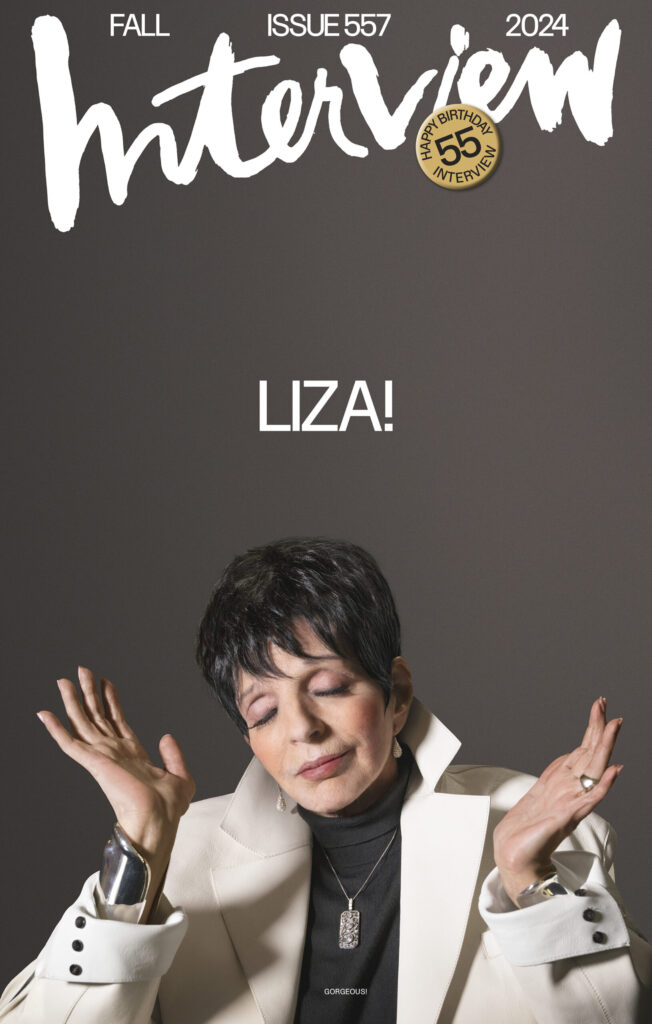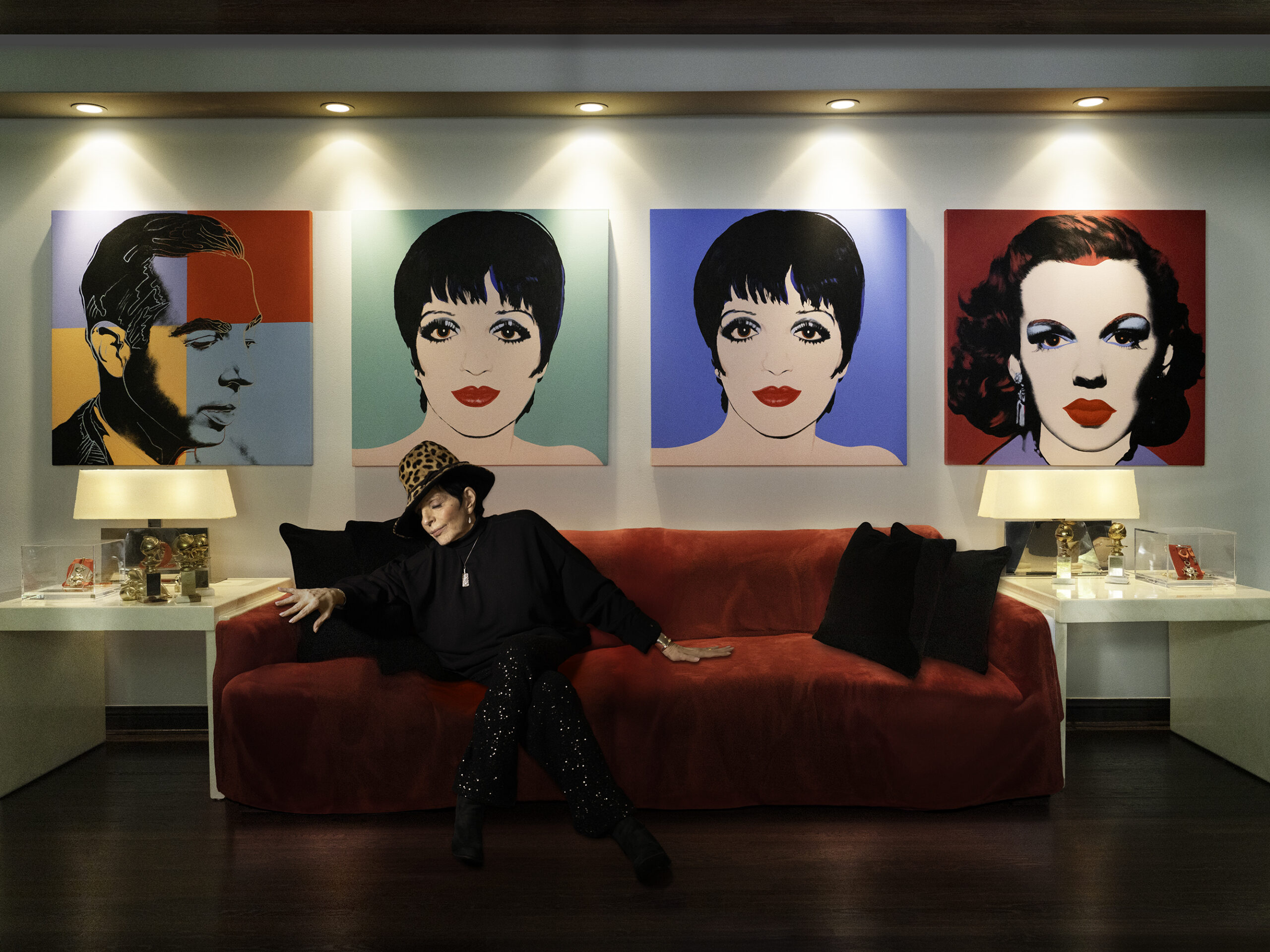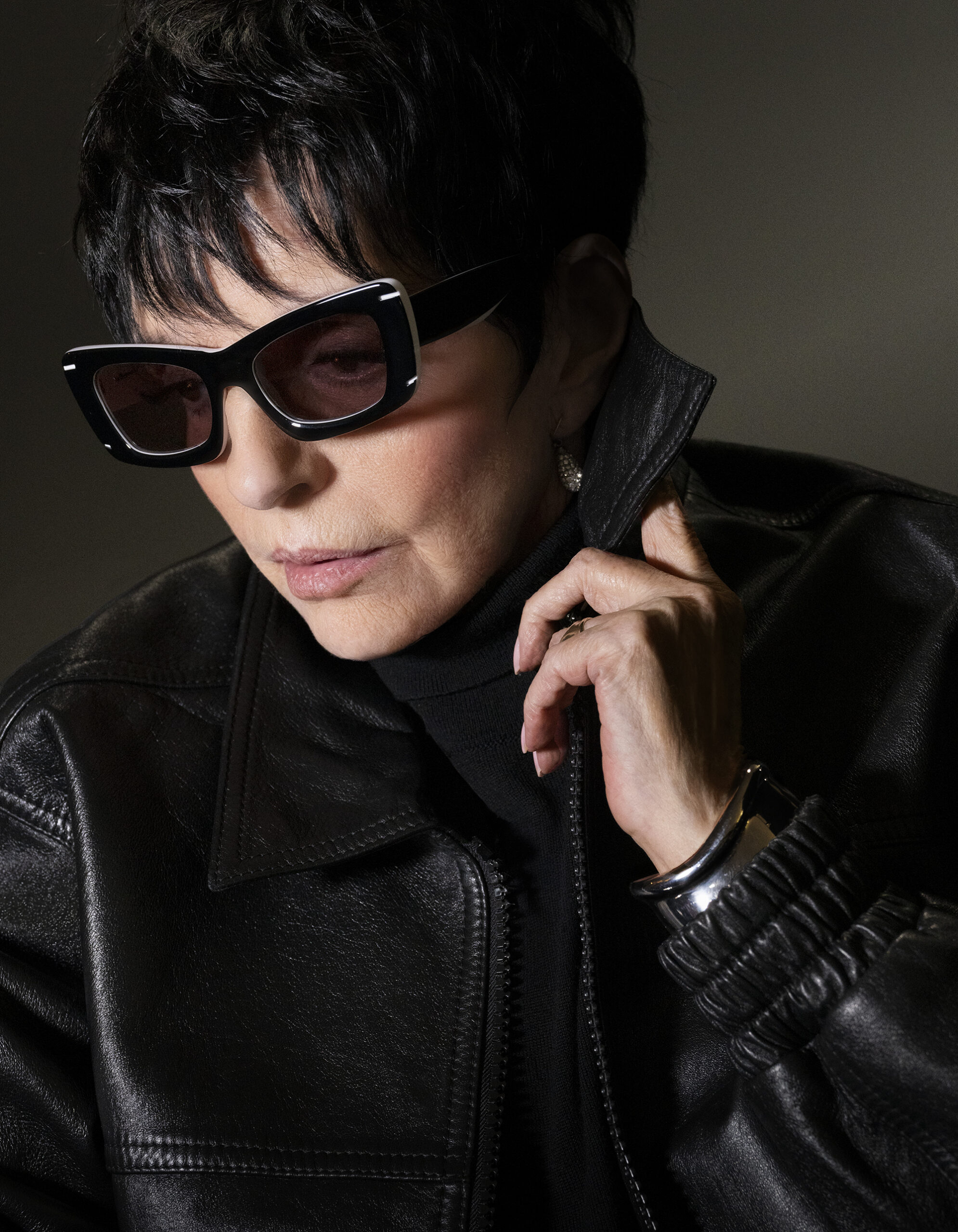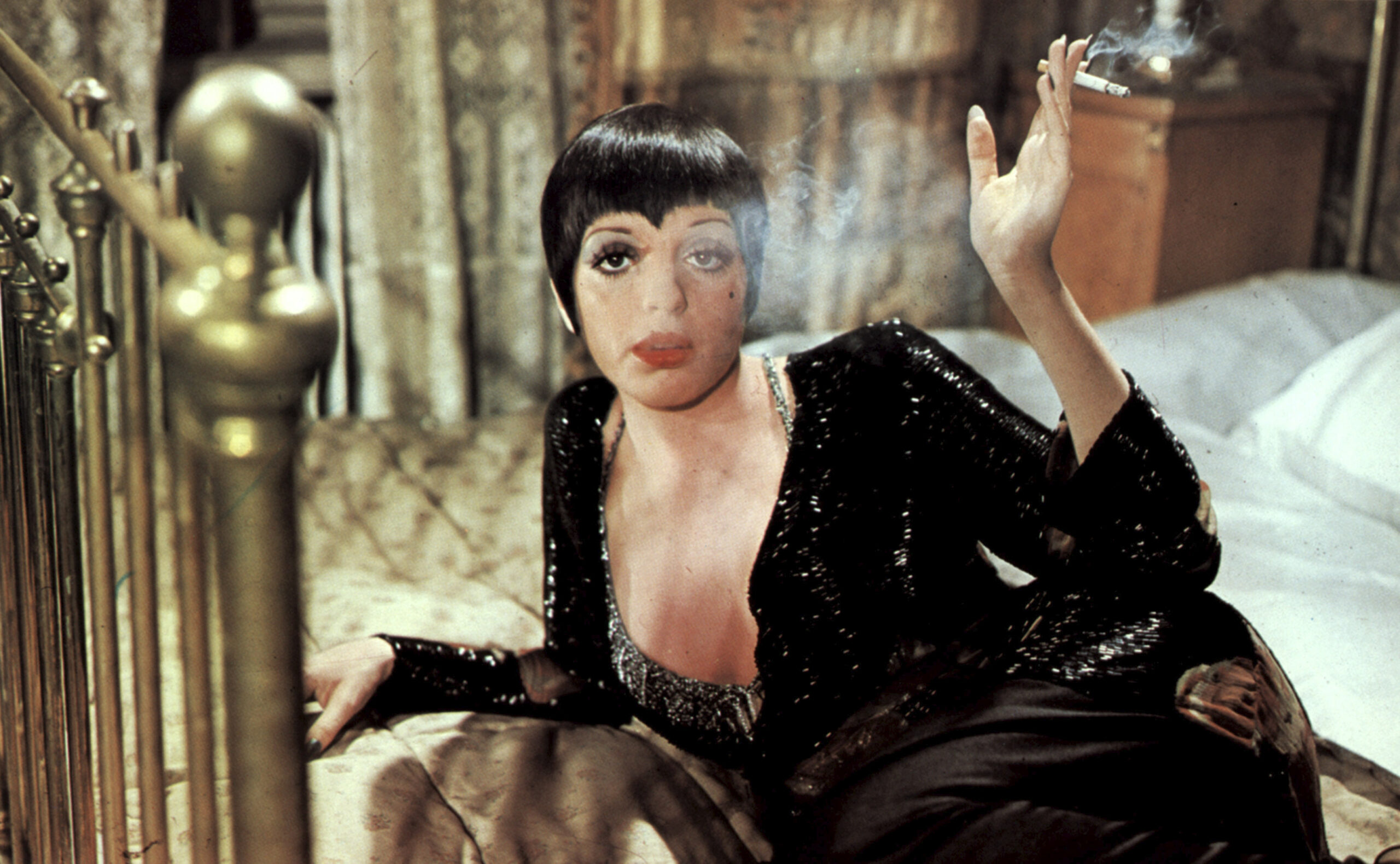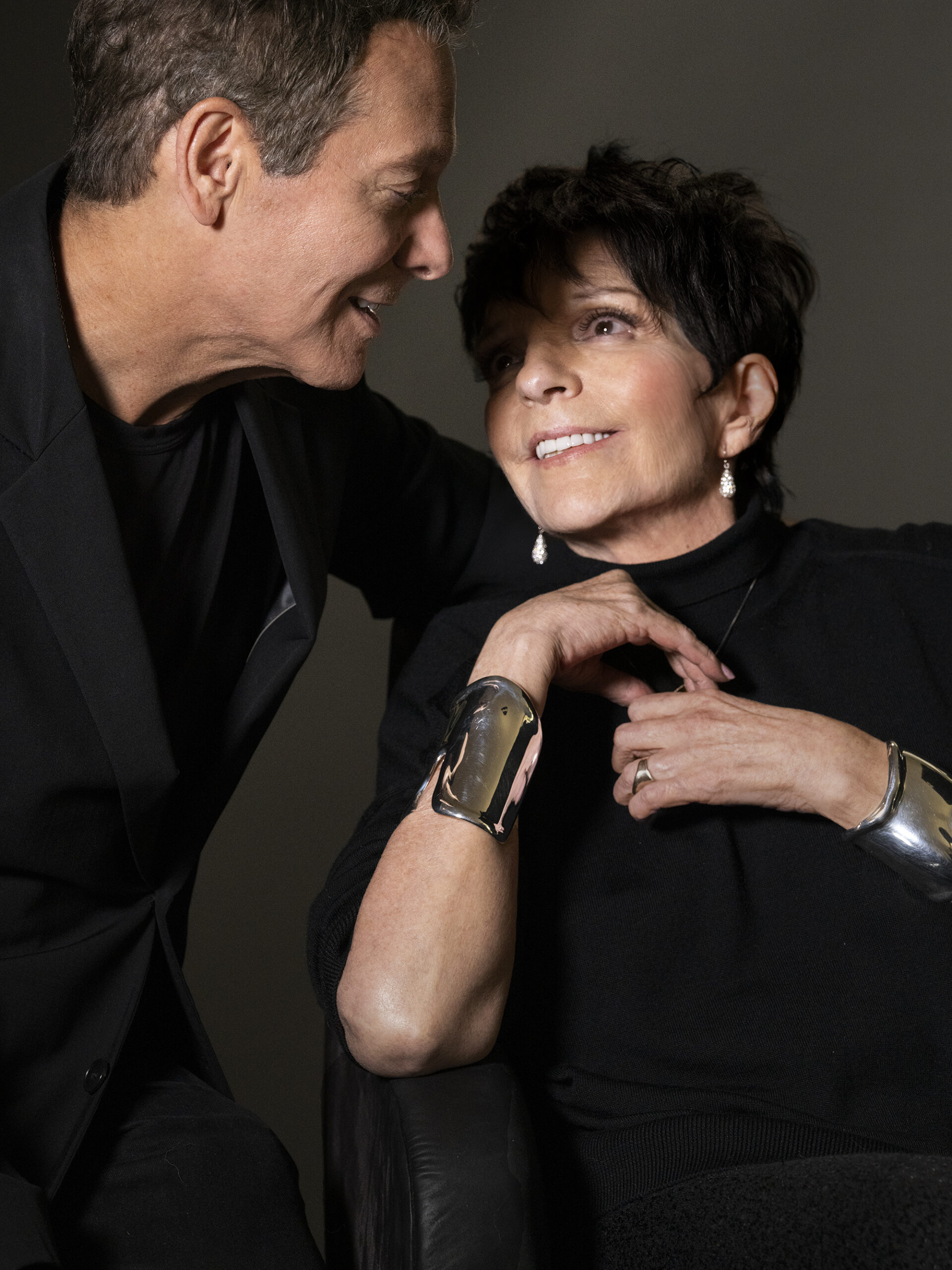Liza Minnelli wears Coat and Sweater Bottega Veneta. Necklace, Vintage Elsa Peretti for Tiffany & Co. Earrings, Cuff, and Ring (worn throughout) Liza’s Own.
“I was never allowed to be a kid until I got to be a grown-up,” said Liza Minnelli in the pages of this magazine. As the progeny of two massive talents, Judy Garland and Vincente Minnelli, being a child of Hollywood was, for Liza, a career in itself. But as we all know, she sailed her own course into stardom, and is maybe the most talented singer and dancer to ever jump from the stage to the screen. Liza, with boundless personality and energy, was also a Warhol and Interview magazine darling, having been first introduced to Andy in the early ’70s by their mutual friend Halston. As Andy said in his 1979 book Exposures, “Liza is always on and I am always off. Liza has what Diana Vreeland calls ‘built-in show biz.’ Whenever Liza walks into a room, everything stops and people wait for the act to begin.” That fact is as true today as it was then. If there is anyone left who can be called a legend, it’s her. For her fourth Interview cover, Liza got together with her old friend and fellow musical talent Michael Feinstein, at her home in West Hollywood, to discuss memories of her famous childhood. The two communicate the way only two old Broadway stars can—erupting mid-sentence into standards by Nat King Cole, Cole Porter, Ella Fitzgerald, and the like. If any laugh should be recorded and preserved for future generations, it’s the excited and devious laugh of Liza, someone eternally young.
———
TUESDAY 8 PM JULY 23, 2024 LA
MICHAEL FEINSTEIN: Here we are at your beautiful, beautiful home.
LIZA MINNELLI: That you found for me, Michael. Thank you so much.
FEINSTEIN: This place used to belong to Fred Astaire’s rehearsal pianist, Hal Borne, who in later years was Omar Sharif ’s vocal coach on Funny Girl.
MINNELLI: Oh, wow. How nice.
FEINSTEIN: So this place has good musical vibes.
MINNELLI: Now, what does Interview want to know?
FEINSTEIN: Let’s start with your childhood. What was the most glamorous part of it and what was the most challenging?
MINNELLI: The most glamorous was my father, and the most challenging was my mother. [Laughs] I bounced back and forth because they were divorced, but I loved them both so much. My mother was fascinating because she knew so many fascinating people who would come over. And my father used to let me go to the set and watch him direct. I’d go to the dance room where they choreographed stuff and learn it. I’d watch people like Cyd Charisse and Gene Kelly.
FEINSTEIN: Do you remember when your parents got divorced?
MINNELLI: No, not really. I don’t even remember how old I was, but you can look it up.
FEINSTEIN: Did you ever hope that they’d get back together?
MINNELLI: No, because they didn’t really like each other so it wasn’t fun to be around them. My father knew me so well. He knew what to bring me and what I would love. I remember he designed all the clothes for Radio City Music Hall, and I got five costumes every Christmas—a ballerina, or the costume from “Shall We Dance” from The King and I. One time the costume was a very attractive green bug. It had a little hat and the antennae on top. With those costumes, he put magic and romance into my life.
FEINSTEIN: He was extraordinary. You gave me two big paintings he had done. They were backdrops and they’re so large I could put them on a big wall. Every painting he did was so different stylistically. You have so many of his paintings here—
MINNELLI: All the ones in the bedroom. It really depended on what he was working on. When he was working on a drama, something like The Bad and the Beautiful, he would design a beautiful black one-armed dress with a train that came so the actress looked beautiful.
FEINSTEIN: He was so talented. Did he ever meet Andy Warhol?
MINNELLI: Oh, sure. He met him with me. I introduced them. Not when he was a costume maker, but when he was a film director. I remember it was a Monday night in New York. We’d have Monday night parties because everyone was off from Broadway on Mondays, so it was always, “Let’s go hang out with Liza.” Everyone would come. You were there!
FEINSTEIN: I was at some of the later ones. Now, you said your dad understood you. Did your mom understand you?
MINNELLI: Yes, but my mother was strict, and it depended on what mood she was in or whether she was working too hard and they were pushing her too much. Or whether she didn’t like who she was married to at the time. Stuff like that. Every kid goes through that. But my father, he treated me like a princess.
FEINSTEIN: He once told a story that you were going to camp somewhere. He was driving for about 45 minutes, and you said, “Where’s my doll?” You didn’t have it with you and you said, “I have to have my doll.” And your father turned around and drove back 45 minutes.
MINNELLI: And got my doll!
FEINSTEIN: And then drove back and all the way to summer camp.
MINNELLI: He was enchanted that he had made such a little girl. That’s really the way to explain it. He’d work all week and take me to the movies on Saturdays. I was always at his house. Mama was interested in a different way because she was very interested in detail, like most mothers. Then when Lorna and Joey [Luft, from Judy Garland’s marriage to Sidney Luft] arrived, I became freer. Everyone took care of them because they were nine and seven years younger than I was, so I got to stay with my dad a little bit more. But I loved my mom. She was funny.
FEINSTEIN: She was so funny. There are stories I don’t even know if we can print!
MINNELLI: [Laughs] No, probably not.
FEINSTEIN: I guess we can print this one. Ethel Merman was on your mom’s TV show. It was the ’60s and Ethel was wearing a short miniskirt, and your mother said, “All I could think of was the Holland Tunnel.”
MINNELLI: [Laughs] That was Mama. But I think my dad understood little girls. He was so enchanted that he had one and he let me feel that all the time.
FEINSTEIN: I went to the Greek Theatre when you were performing, and your dad was there and he was transfixed. You sang “The Man That Got Away” [a song originally sung by Garland in 1954’s A Star Is Born], which is something you’d never done before. It was part of a salute to showstoppers or something like that. And your father said to me, “She sang that better than her mother.”
MINNELLI: Oh, I love that. That was Daddy. Thank you for telling me that story. It means a lot. He was so proud of me. So was Mama, but Mama was Mama. Everybody’s mother has things that they adore about their kid and things that drive them crazy.
FEINSTEIN: I feel like you knew your mother better than anybody. So she knew that no matter what she did, you would forgive her. She could be awful because she knew how much you loved her.
MINNELLI: Yeah. Ten minutes later, she’d come in and say, “Let me give you a hug.” She was kind of a normal mother in an extraordinarily talented body. I remember [composer] Roger Edens would come over to the house to play. That was normal.
FEINSTEIN: Oh, god. I so envy that you knew Roger Edens. He created the modern film musical. He signed with MGM six weeks before your mom did.
MINNELLI: My darling, I grew up with the most interesting people. But you see, that kind of childhood was fine with me because all my other girlfriends had famous parents, too.
FEINSTEIN: Who were the kids you hung out with?
MINNELLI: Let’s see. Lana Turner’s kid, Cheryl Crane, who ended up killing her mother’s friend. Sammy Cahn’s kid, Laurie. And [Humphrey] Bogart’s kid, Leslie. And Bing Crosby’s kid. We all grew up in the same neighborhood and you could tell a lot about us by who we liked. I always liked funny people. And kind people. But you know, all those stars made it look easy. People never understood how difficult all the work behind it was.
FEINSTEIN: That’s because the job was to make it look like it was nothing.
MINNELLI: Yeah. Like you were sitting at home and it just happened. Or you were lucky enough to be there when it happened.
FEINSTEIN: When did you become aware of the press?
MINNELLI: Early! My dad would never let me see any of the stories written about us. And if I heard some story, he’d take me aside and say, “You know that’s not true, right?” So I learned that early on from him. But they both gave me a strong sense of being myself. Mama would say, “You’ve got two very famous people as your parents.” So I learned that if people start trying to drag you into talking about who did what and where, forget them. My life is just as interesting as theirs were, believe me.
FEINSTEIN: What’s the biggest misconception people have about you?
MINNELLI: They read trash and tripe and don’t know that my life is really beautiful. It’s filled with loved ones, laughter, creativity, and emotional as well as financial safety. People weaponize crazy stories, it’s a friggin’ bore. I don’t think people understand what a close family we are. My sister Lorna and I get together and giggle. She has the family courage. I love each of my siblings. My brother Joey, my sister Tina [from Vincente Minnelli’s second marriage]. Her kids were here with me for a few days and the press did not find out. Ha!
FEINSTEIN: Did the press ever get to you at all? I’m asking because I’ve had things printed about me that were awful or just untrue.
MINNELLI: Yes, of course. Sometimes it hurt my feelings, but your job as an artist is to not listen to them and do what you do, which they can’t do.
FEINSTEIN: I’ve learned that from the best, and you’re the best. You’ve given me an insight into your soul which has changed me and changed the way that I live my life and therefore make music. Because life is fundamentally about being open-hearted.
MINNELLI: Yes, and also about knowing when not to be open-hearted.
FEINSTEIN: When you have to protect yourself. Absolutely.
MINNELLI: And that’s what I learned growing up with my parents. But that’s also why I liked New York so much. That and I wanted to dance.
FEINSTEIN: And dance you did. My god.
MINNELLI: I know! I couldn’t wait to get to New York to go on Broadway and make some noise. That was my dream, and I got cast in Best Foot Forward, a revival Off-Broadway [in 1963].
FEINSTEIN: That was your first big success. And the actress Veronica Lake was in that production too, which I find intriguing because there’s a line in one of the songs that goes—
MINNELLI: [Singing] “As hard to take as Veronica Lake.”
FEINSTEIN: How did she take being in a musical revival where one of the songs makes fun of her?
MINNELLI: I have no idea. But it was in a humorous situation so I’m sure not badly.
FEINSTEIN: Of all of your adult relationships, which was your most special?
MINNELLI: You! We think alike.
FEINSTEIN & MINNELLI: [Singing together from the song “Triplets”] “We do everything alike. We look alike, we walk alike, we talk alike. We dress alike and what is more, we hate each other very much. We hate our folks, we’re sick of jokes on what an art it is to tell us apart.”
FEINSTEIN: One person in your life where your eyes light up whenever you talk about them is Jack Haley [Jr., Minnelli’s ex-husband, who died in 2001].
MINNELLI: I do light up. He was the loveliest man, the gentlest and most interesting.
FEINSTEIN: Jack was an original.
MINNELLI: Oh, he really was, because he understood how to make something original for whoever it was that he was working with.
FEINSTEIN: And he created That’s Entertainment [a 1974 musical documentary celebrating MGM’s 50th anniversary].
MINNELLI: That’s what I mean. He could pick out things that nobody had heard of and make them significant. That’s a wonderful movie.
FEINSTEIN: When you’re hosting, you say, “Thank god for film.”
MINNELLI: [Laughs] Oh, baby!
FEINSTEIN: That film introduced me to a lot of musicals.
MINNELLI: I think about you whenever I hear the song “Cabin in the Sky.” [Singing] “There’s a little, little cabin in the sky, Mister, an acre or two of heavenly blue to plow. Can’t you see that cabin in the sky? Mister.”
FEINSTEIN: Do you believe in reincarnation?
MINNELLI: Yes.
FEINSTEIN: I do too. I don’t think this is the first time I’ve known you.
MINNELLI: Oh, I don’t think so, either. Although every time I’m with you, I feel like it’s the first time because we still have so much to say to one another.
FEINSTEIN: Yeah, it’s true. There’s always a lot to say. [Singing Ella Fitzgerald’s “What Is There to Say”] “What is there to say? And what is there to do? My heart’s in the deadlock. I’d even face wedlock.”
MINNELLI: Ha! Isn’t that the greatest line? We have to sing that in our show.
FEINSTEIN: Sometimes I wonder why the Ritz hotel never did an ad using the song “Puttin’ on the Ritz.” “If you’re blue and you don’t know where to go to, why don’t you stay where fashion sits, stay at the Ritz.” It’s a natural jingle.
MINNELLI: We should make that album together, just you and I, and at the end of the last song, the strings should come in at the break.
FEINSTEIN: And suddenly you’re in technicolor!
MINNELLI: And suddenly you hear the instrumentation. I believe in orchestrations.
FEINSTEIN: More than Jesus?
MINNELLI: [Laughs] You can orchestrate your own life, you know.
FEINSTEIN: Hearing the swirling strings, it’s like you see the world coming to life. Your ear is amazing. The first time I was at an orchestra rehearsal with you, you were listening to the band play your arrangements for the first time for the new tour, listening to make sure that it’s right.
MINNELLI: You were there when I stopped the music a couple of times.
FEINSTEIN: That’s right. At one point you said, “That horn is off,” and the arranger was there, and the arranger said, “I don’t hear it,” and you said, “No, no, it’s off,” and you were right.
MINNELLI: But I was always kind about it. God, I loved that dance music. All that Fred Astaire and The Band Wagon.
FEINSTEIN: That was from my two favorite arrangers, Conrad Salinger and Skip Martin, both of whom died tragically. Not long before Salinger died, he did a couple of charts for your mom that are gorgeous.
MINNELLI: When I was a kid and mama was at the piano, she’d say, “Sing with me!” And I’d say, “Okay, if nobody’s around.”
FEINSTEIN: I’m sure your voice was terrific even then.
MINNELLI & FEINSTEIN: [Singing] “I’m just breezin’ along with a breeze.”
MINNELLI: I don’t think anybody would believe how many songs we both know.
FEINSTEIN: Oh, we’re our own Library of Congress. So we’re talking for the cover of the 55th anniversary of Interview magazine, which was started by your friend, Andy Warhol.
MINNELLI: I was on the cover a few times.
FEINSTEIN: You were on the cover three times before this issue. First you were on the cover in ’72. Then my favorite is the one where it looks like Andy’s art from 1978. It’s very stylized and glamorous. Your face is long like a Modigliani. And the colors are just—
MINNELLI: Oh, what Andy could do with color! Nobody could do that! They’d try but it never worked like Andy did it.
FEINSTEIN: What was it like being photographed and painted by Andy? How did he see you differently than others did?
MINNELLI: He made me see myself and my parents differently. He found emotional colors that I’d never noticed before. I will always cherish what Andy captured. I see his brilliance every day and it lives right here. [Pats her heart]
FEINSTEIN: What stands out in your mind about your friendship with Andy?
MINNELLI: Three words: Genius. Trust. Generosity.
FEINSTEIN: You’ve got four Tonys, two Grammys, an Emmy, and an Oscar. Out of all these awards, which one holds the most significance for you?
MINNELLI: Each one is equally important for different reasons. I never thought I’d win that Oscar. I was sure Diana Ross was going to get it [for Lady Sings the Blues]. One lasting gift is that when I won, my father was sitting next to me, and he screamed so loud in my ear I had tinnitus that never went away.
FEINSTEIN: How do you want to be remembered?
MINNELLI: I made my own lane. I worked and still work as hard as anyone can, and I love each person who supported me and cares about me for me. I love performing. I still take dance lessons, and when I sing to people in the theater, I’m not giving a performance—I’m sharing my love with each individual person. I’m asking, “This is how I feel. How ’bout you?” My work is real.
FEINSTEIN: What is Liza’s life like today?
MINNELLI: I’m writing, creating, and working with Tiffany & Co.’s [creative director] Christopher Young, who is a pure genius. We’re collaborating on new ways to celebrate Elsa Peretti. I’m also recording again and producing with you, Michael, and Sam Haskell. Our baby business just keeps growing, and at this age that’s a helluva good time. You didn’t ask, but I have one piece of advice: Take care of your body ’cause you might live longer than you expect to. I just keep replacing parts and moving forward. You just deal with it and be happy, and as Dick Van Dyke sang and taught to me, “Put on a Happy Face.”
FEINSTEIN: What do you want to confess?
MINNELLI: Nothing! At least nothing more until my memoir comes out. I don’t give interviews normally. This one with you is rare. You’re always so good to me, Michael. My dearest, dearest best friend.
FEINSTEIN: You are a very deep and special part of my life.
MINNELLI: Well, you’re a gift in mine, kid.
———
Hair: Louise Moon using Oribe at Cloutier Remix.
Makeup: Tina Smith using MAC Cosmetics at The Milton Agency.
Photography Assistants: Tyson Smyer and Gerardo De La Paz.
Fashion Assistant: Iris Diane Palma.
Production Management: Vince Barrucco.
Post-production: Rick Allen.
Special Thanks: Westie at L.A. Eyeworks.

